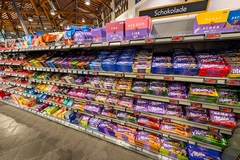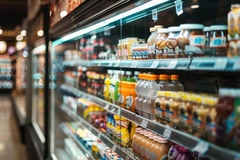
- Industry news
Industry news
- Category news
Category news
- Reports
- Key trends
- Multimedia
- Journal
- Events
- Suppliers
- Home
- Industry news
Industry news
- Category news
Category news
- Reports
- Key trends
- Multimedia
- Events
- Suppliers
Arla Foods goes solar to avoid dependency on unreliable Polish grid
15 Mar 2023 --- The Ukraine war is causing shortages in energy supply, which are creating a challenge for the continuity of Arla Foods’ repackaging site in the country. With an estimated output of 1620 megawatts hour per year, the solar panels will cover 85% of the site’s energy consumption and will be able to store 2.6 megawatts hour in a battery to partly power the site during the night.
The €2.99 million (US$3.21 million) investment will help the company reduce carbon emissions by 1,645 metric tons per year, as most of the energy previously came from the coal-dominated Polish energy grid.

“This is a sensible investment on all levels. Not only does it make securing business continuity easier for our employees, it also reduces run rate costs at the site and creates a more sustainable energy source showing the way for future energy investments in the region,” says Arla Foods executive VP and head of supply chain, David Boulanger.
Coal-fueled Poland
Poland’s energy supply is dominated by fossil fuels, representing 85% of the country’s energy sources in 2020. The largest share came from coal (40%), followed by oil (28%) and natural gas (17%), according to the International Energy Agency.
 The company expects a return on the solar panel investment in seven years.Furthermore, according to the European Commission, Poland’s coal use represented 41% of the total hard coal consumption of the EU as of 2021.
The company expects a return on the solar panel investment in seven years.Furthermore, according to the European Commission, Poland’s coal use represented 41% of the total hard coal consumption of the EU as of 2021.
“At Arla Foods, we want to lead in sustainable dairy. That also means that if there isn’t a sustainable solution in place, we will go the extra mile and create our own and that is exactly what we have done in Poland,” explains Boulanger.
“Even if it’s not one of our biggest sites in terms of energy consumption, it shows that we put action behind our words when it comes to improving our operations and use 100% renewable electricity in Europe by the end of 2025,” he continues.
The company expects a return on the solar panel investment in seven years.
Going green
Arla Foods is engaging in larger green investments, such as a 2500 megawatts hour solar plant in Bahrain and a 250.000 megawatts hour per year partnership in Denmark. The company plans to achieve a 63% carbon emission reduction in 2030 – compared to 2015.
Investments in more contaminant countries have a higher incidence in the company’s environmental goals.
Similarly, Mondelēz International also recently announced it is turning to solar energy in Poland to offset the electricity-related carbon footprint of eight of its domestic factories.
Edited by Marc Cervera











